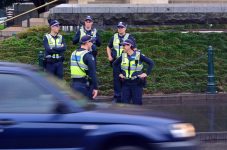Couple Awarded Compensation After Illegal Raid

In yet another example of taxpayers paying for police misconduct, the State of Queensland has been ordered to pay couple David Bulsey and Yvette Lenov $230,000 in damages plus interest and legal costs after police illegally raided their home, assaulted, illegally arrested and unlawfully detained them.
Background to the Arrests
On the 19th of November 2004, a 36-year-old man by the name of Cameron Domadgee tragically died while in police custody on Palm Island.
A public meeting was held on 26th November, which heard that Mr Domadgee’s death was caused by a ruptured liver resulting from the exertion of force by police officers. David Bulsey, a close friend of Domadgee, was ‘extremely critical of police’ during the meeting, accusing them of murdering his friend.
Riots occurred later that day, during which residents expressed their disgust towards police and set Palm Island Police Station on fire.
After the riots, local detective Robinson gave a list of arson suspects to Townsville detective Miles, which did not include Mr Bulsey. Detective Miles then took it upon himself to add the name of Mr Bulsey before even attending the island, raising the inference that Bulsey was added due to his condemnation of police rather than any evidence that he participated in the arson.
The Arrests
In the early hours of 27th November, Mr Bulsey’s partner, Yvette Lenov, was enjoying a cup of tea at home while her children and Mr Bulsey were asleep when a large number of police officers – including six heavily armed members of the Special Emergency Response Team (‘SERT’) wearing black helmets and masks– surrounded her house and banged on the door.
Without a warrant, and before the seven-month pregnant Lenov had a chance to answer, SERT smashed down the door and raided the home. She was ‘threatened and her will was overborne by a team of armed police’ who pointed assault weapons at the terrified woman and aggressively shouted commands.
The officers then rushed Mr Bulsey’s bedroom where he had been asleep:
‘the next thing… [Mr Bulsey] knew he was on the floor with a boot at his head, the men had guns and helmets, he was handcuffed behind his back, he had no pants on, only a shirt… being held by the SERT operatives pointing guns at his head and back’.
He was then dragged half-naked through the house and yard, and into an awaiting police vehicle.
Mr Bulsey was taken to the police station and charged with the relatively minor offence of ‘unlawful assembly’. He was refused bail at the police station and kept in custody for two days before being brought before a magistrate. The charge of ‘unlawful assembly’ was later replaced by ‘riotous assembly’ and ‘destruction of a building’.
Police ultimately dropped all charges against Mr Bulsey, conceding that there was insufficient evidence that he had committed any offence.
Questions Raised
The incident raised a number of questions about the conduct of police, including:
- Why did Detective Miles add Mr Bulsey’s name to the list of arson suspects before attending the island, when local detectives who investigated the incident provided him with a list excluding Bulsey?
- Why didn’t police obtain a warrant for the raid or arrest?
- Why did police feel the need to execute the raid at the couple’s home in the early hours of the morning using heavily armed SERT officers, rather than simply calling Bulsey into the police station for questioning or arresting him in another way / at another time / using regular officers; especially given:(i) the lack of any evidence that Mr Bulsey was armed or a threat to anyone, and(ii) the fact that his heavily pregnant partner and her children were present, which was either known to police or easily ascertainable?
- Why did police feel the need to perform the arrest in such a violent manner – pulling the semi-naked man from his bed, putting a boot to his head, pointing guns at him, dragging him through the house, and yard, and into an awaiting van?
- Why did the heavily armed and masked SERT officers feel the need to threaten and point their assault weapons at the heavily pregnant Ms Lenov?
Powers of Arrest in Queensland
In Queensland, section 365 of the Police Powers and Responsibilities Act 2000 allows police to arrest people without a warrant if they ‘reasonably suspect’ the commission of an offence, or if an arrest is reasonably necessary for a range of other reasons; including to establish a person’s identity, preserve evidence, ensure the safety of another person or prevent a person from fleeing.
Police relied on this section to justify their conduct towards Mr Bulsey and Ms Lenov.
The Proceedings
The pair sued Queensland police through the State of Queensland.
The Queensland Court of Appeal (QCA) found that police could not have ‘reasonably suspect[ed]’ that Bulsey or Lenov had committed an offence when they performed the raid and arrest.
The Court was highly critical of police, noting that they did not even review evidence from the riot, or gather any other evidence, before performing the ‘heavy handed’ and ‘unjustified’ operation – they simply relied upon Miles’ addition of Bulsey to the list of suspects.
This, in the Court’s eyes, was a manifestly insufficient basis for the raid, arrest and detention.
The QCA ultimately awarded $165,000 in damages to Mr Bulsey and $70,000 to Ms Lenov, plus interests and legal costs.
The individual police officers will not bear any of that cost, and there has been no indication that any officers will be disciplined.
Powers of Arrest in NSW
Section 99 of the Law Enforcement (Powers and Reponsibilities) Act 2002 (‘the Act’) lists the circumstances in which police can arrest a person without a warrant. The section was recently amended to significantly broaden those circumstances, now allowing police to arrest without a warrant if they:
- Suspect on reasonable grounds that a person is committing or has committed an offence, or
- Are satisfied that an arrest is reasonably necessary to:
- Stop the person committing or repeating the offence or committing another offence;
- Stop the person fleeing from a police officer or from the location of the offence;
- To enable inquiries to be made to establish the person’s identity if it cannot readily be established or if the police officer suspects on reasonable grounds that identity information provided is false;
- To ensure that the person appears before a court in relation to the offence,
- To obtain property in the possession of the person that is connected with the offence,
- To preserve evidence of the offence or prevent the fabrication of evidence,
- To prevent the harassment of, or interference with, any person who may give evidence in relation to the offence,
- To protect the safety or welfare of any person (including the person arrested),
- Because of the nature and seriousness of the offence.
In addition, section 21 of the Act gives police the power to stop, search and detain a person without a warrant if they suspect on reasonable grounds that the person has in their possession or under their control:
- Anything stolen or otherwise unlawfully obtained;
- Anything used or intended to be used in or in connection with the commission of a relevant offence;
- A dangerous article in a public place that is being or was used in or in connection with the commission of a relevant offence; or
- A prohibited plant or drug, in contravention of the Drug Misuse and Trafficking Act 1985.
The case of R v Rondo found that a ‘reasonable suspicion’ cannot be random or arbitrary – it must be have some factual basis and involve more than just a possibility that the person was in possession of drugs, or that one of the other stated circumstances exists, before stopping, searching and arresting a person.
In terms of carrying out arrests, section 231 of the Act states that:
‘A police officer or other person who exercises a power to arrest another person may use such force as is reasonably necessary to make the arrest or to prevent the escape of the person after arrest.’
Yet despite Rondo and section 231, there are still regular cases of police breaking the law by wrongfully arresting people, and/or using excessive and unnecessary force when carrying out those arrests.






